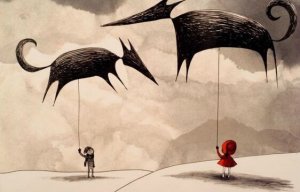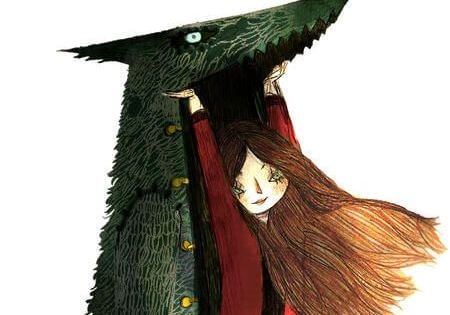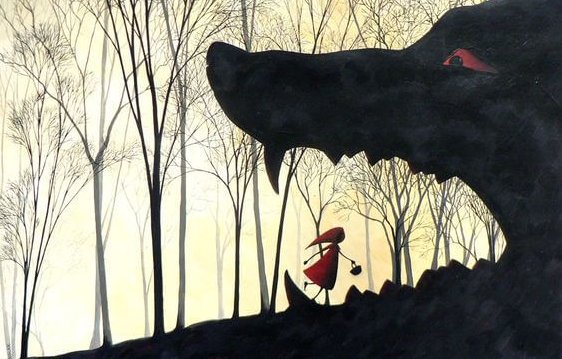Changing Perspective: Are You The Wolf in Another's Story?


Written and verified by the psychologist Valeria Sabater
Sometimes, almost without realizing it, we become the bad guys in the story, we become the “wolf” of Little Red Riding Hood. At these times we need to practice changing perspective. We are the big bad wolf because we told someone off with good reason, said the truth out loud or acted according to our values . We are the bad wolf because we interfered in their lives and didn’t do what we were “supposed” to do. It is a dangerous thing to fall into the trap of classifying and separating those around us into “good and bad people”. We do it so often that we barely notice it. For example, if a child is obedient, calm and quiet we instantly say that they are “good”. However, if they have character, answer back, are restless and very prone to tantrums, then we don’t think twice about saying out loud that they are a “bad” boy or girl.
“A story always acquires the colors given by the narrator, the surroundings it is told in and how it is received”
We often act in line with our self-built ideas regarding what we expect from others. We have already decided what we consider suitable and respectable, about what we understand as nobility or goodness. And so, when just one part of this “fails”, when a single element of our internal guidelines is not met or shown, then we don’t hesitate to classify that person as inconsiderate, toxic or even “evil”.
Being the wolf in someone else’s story is quite common. However, in many of these cases it is necessary to analyze the person who lives under that red hood.

When creating our own “stories” gives us security
Little Red Riding Hood is an obedient girl. On her journey through the forest she knows that she mustn’t leave the beaten track. There are rules to follow and she must act according to what she has been taught. However, when the wolf appears, her perspectives change. She is captivated by the beauty of the forest, by the sound of the birds, the touch of the flowers, the fragrance of that new world so full of different sensations. The wolf in the story, therefore, represents intuition and other side of human nature in all its wildness
This metaphor undoubtedly helps us to better understand many of the dynamics we encounter every day. There are people who, like Little Red Riding Hood at the beginning of the story, show an inflexible and regulated behavior. They have decided how relationships should work out, what a good friend should be like, how a co-worker should behave and what makes an excellent son and partner. Their brains are programmed to look exclusively for conformity and uniformity, because that’s how they get what they most need: security.
When the story goes wrong
However, when a wrong chord is struck, when someone reacts, acts or responds differently to what they expected, they panic. This person is suddenly a threat, and this starts to cause them stress. An opposing opinion is seen as an attack. A different idea, a harmless refusal or an unexpected decision deeply disappoints them and is seen as an insult and a snub.
Thus, almost without looking for it, anticipating it and without even wanting it, we became the “wolf” of the story, the person who followed his intuition and hurt the fragile being that lived inside the hood.

There is, however another side to the story: we often act like Little Red Riding Hood herself, the girl who made the mistake of making up her own story. We draw up and devise plans about what our life should be like. About how to have an ideal family and what our best friend should be like. And, of course, that perfect love that never fails and that fits in with everything other part of our life. Just imagining it fills us with excitement, the thought of it gives us security and we fight to make sure everything happens as we would want it to.
However, when the story stops being a story and becomes a reality, everything collapses, and in come the wolves to devour our almost impossible fantasies.
Good and bad people: which one are you in the story?
Being the wolf in someone else’s story is not pleasant. There may or may not be tangible reasons why we are that wolf. Whatever the situation, they are uncomfortable experiences for all concerned. However, there is a very basic aspect that we cannot ignore. On occasions, being the “bad guy” in someone else’s story has allowed us to be the “good guy” in ours. Maybe we were the “hero” who was able to get out of a tiring and unhappy relationship, or the character who dared to write “the end” in a story that no longer had any future.
The wolf will always be bad if we only listen to Little Red Riding Hood
Before we end up becoming domesticated wolves living in impossible fables, we must muster up the courage, listen to our own instincts and act with intelligence, respect and guile. Acting according to one’s own principles, needs and values is not being malicious. It is simply living according to one’s own instincts, and knowing that in the forest of life, the good ones are not always just so good and the bad ones are not always so bad. The important thing is knowing how to live together with genuine honesty, without wolf skins or hoods.
This text is provided for informational purposes only and does not replace consultation with a professional. If in doubt, consult your specialist.








